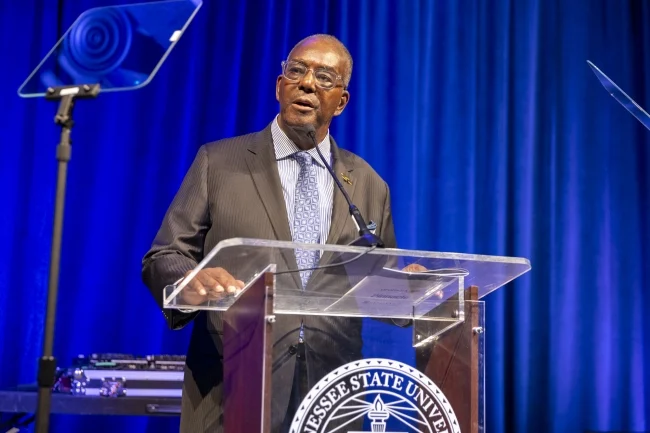By Sara Weissman
The interim president of Tennessee State University, Ronald Johnson, abruptly announced plans to resign on Wednesday after leading the historically Black land-grant institution for less than six months, as The Tennessean first reported.
Dakasha Winton, chair of the university’s Board of Trustees, implied in a statement that the board pressured Johnson to leave.
The board’s “job is to ensure the future strength of the school through thoughtful and decisive governance,” she wrote. “In service of this commitment, and as board chair, I spoke with interim president Dr. Johnson on Tuesday about separating from the university. He has chosen to resign and tendered his resignation this afternoon.”
In an interview with Inside Higher Ed on Monday, Johnson had waxed optimistic about the measures he was taking to shore up the dire financial health of the university.
Tennessee State is a “social impact institution affecting people of all walks of life, and that’s why we are here, to ensure it continues to matter in the future,” he said.
Two days later, Johnson sent a letter to students and staff saying that “with a heavy heart,” he was resigning effective Friday. The decision was “not made lightly,” he wrote, but it “has become apparent there is a fundamental difference of perspective with the Board on how best to move this institution forward.”
“As I step away from this role, I remain hopeful and confident that TSU can overcome its challenges,” Johnson wrote. “The road ahead will be difficult, but with the right leadership, collaboration, and vision, TSU will continue to thrive as an institution that truly matters—not just to Tennessee, but to the nation and world.”
A separate statement from the university thanked Johnson for his “dedicated service” and applauded him for taking steps toward the university’s financial stability, including securing emergency funds from the state, saving $13 million through layoffs and expense cuts, helping to raise $500,000 in a campaign to support students with debts, and “enhancing transparency and trust with stakeholders.”
“TSU remains committed to building on the progress made during his time and continuing to advance the university’s mission,” the statement read.
‘Warp-Speed’ Drama
Johnson, formerly the interim president of Kentucky State University, took the helm at Tennessee State in July amid a time of political and financial turmoil for the university. The institution had only $8.4 million in reserves on hand when he took over, he told Inside Higher Ed.
Before he arrived, state lawmakers, saying the university was low on funds because it was mismanaged, had voted to oust the university’s entire board in the spring and replace it with TSU alumni chosen by Governor Bill Lee. The move sparked outrage among the university’s supporters, who argue its financial troubles stem from decades of underfunding by the state. A 2021 report by the Tennessee Office of Legislative Budget Analysis found the state owed the university between $150 million and $544 million in unpaid land-grant funds; a 2023 letter to the governor from the U.S. Departments of Education and Agriculture put the amount at $2.1 billion.
The university’s former president Glenda Glover then retired in June with a buyout agreement—another recent area of contention. The Tennessean reported that the university’s Board of Trustees unanimously voted in a November meeting to push Johnson to end Glover’s agreement. She was slated to receive $850,000 through a transition agreement and $212,500 annually for four years to continue helping with fundraising and advising.
Since Johnson’s arrival, he’d been busy trying to combat financial challenges. State auditors told the board in November that the institution could face a $46 million deficit by the end of the current fiscal year. State lawmakers also gave the university an early allocation of $11 million and $32 million in liquid funds, previously earmarked for a new academic building, to enable the university to make November payroll.
This fall Johnson developed a plan intended to get the university through the current fiscal year. Tennessee State also cut 114 positions, froze nonessential spending and hiring, and limited travel for its marching band, along with other belt-tightening measures.
“We’re constantly looking for ways to bring our budget in line with our revenues, with a keen understanding of the purpose of this institution, that there’s nothing that we plan to do that’s going to hurt our mission,” he told Inside Higher Ed on Monday.
Learotha Williams, a professor of African American and public history at TSU, said he was taken aback by the news.
“I’m struck by the suddenness of it,” Williams said. He finds Johnson’s departure unsettling after the university has already undergone so many recent changes and challenges, including the takeover of an entirely new board. “Everything in this drama has played out at warp speed.”
The Board of Trustees called a special meeting on Friday to discuss appointing a new interim president.



